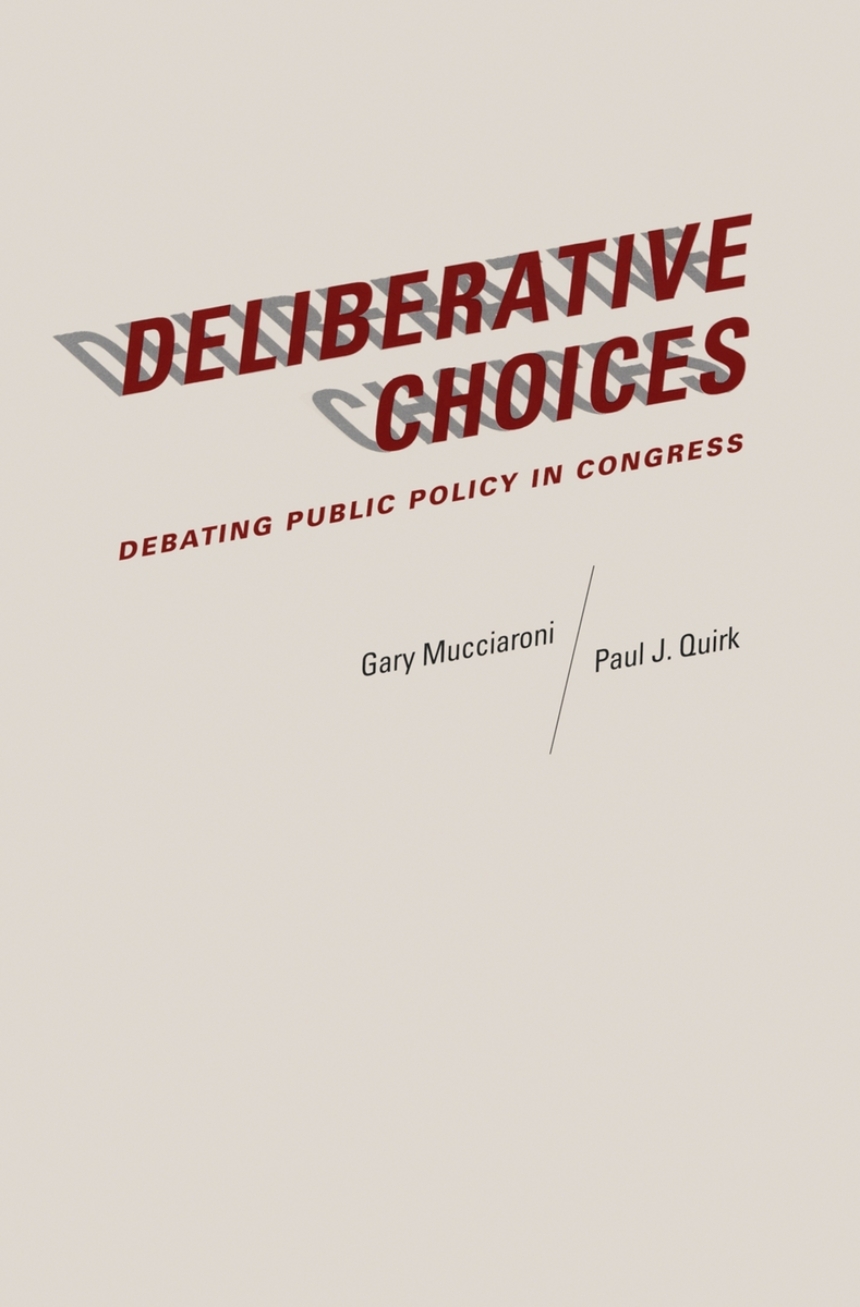Deliberative Choices
Debating Public Policy in Congress
The task of deliberating public policy falls preeminently to Congress. But decisions on matters ranging from budget deficits to the war with Iraq, among others, raise serious doubts about its performance. In Deliberative Choices, Gary Mucciaroni and Paul J. Quirk assess congressional deliberation by analyzing debate on the House and Senate floors. Does debate genuinely inform members of Congress and the public? Or does it mostly mislead and manipulate them?
Mucciaroni and Quirk argue that in fashioning the claims they use in debate, legislators make a strategic trade-off between boosting their rhetorical force and ensuring their ability to withstand scrutiny. Using three case studies—welfare reform, repeal of the estate tax, and telecommunications deregulation—the authors show how legislators’ varying responses to such a trade-off shape the issues they focus on, the claims they make, and the information they provide in support of those claims.
Mucciaroni and Quirk conclude that congressional debate generally is only moderately realistic and informed. It often trades in half-truths, omissions, and sometimes even outright falsehoods. Yet some debates are highly informative. Moreover, the authors believe it’s possible to improve congressional deliberation, and they recommend reforms designed to do so.
Mucciaroni and Quirk argue that in fashioning the claims they use in debate, legislators make a strategic trade-off between boosting their rhetorical force and ensuring their ability to withstand scrutiny. Using three case studies—welfare reform, repeal of the estate tax, and telecommunications deregulation—the authors show how legislators’ varying responses to such a trade-off shape the issues they focus on, the claims they make, and the information they provide in support of those claims.
Mucciaroni and Quirk conclude that congressional debate generally is only moderately realistic and informed. It often trades in half-truths, omissions, and sometimes even outright falsehoods. Yet some debates are highly informative. Moreover, the authors believe it’s possible to improve congressional deliberation, and they recommend reforms designed to do so.
296 pages | 1 line drawing, 37 tables | 6 x 9 | © 2006
American Politics and Political Economy Series
Political Science: American Government and Politics, Public Policy
Table of Contents
Preface
Introduction
1. The Strategy of Claims: A Theory of Congressional Debate
2. Assessing Legislative Debate
3. The Debate on Welfare Reform
4. The Debate on Estate Tax Repeal
5. The Debate on Telecommunications Deregulation
6. Patterns: Strategies and Claims
7. Patterns: Interactions and Information-Value
Introduction
1. The Strategy of Claims: A Theory of Congressional Debate
2. Assessing Legislative Debate
3. The Debate on Welfare Reform
4. The Debate on Estate Tax Repeal
5. The Debate on Telecommunications Deregulation
6. Patterns: Strategies and Claims
7. Patterns: Interactions and Information-Value
8. Improving Congressional Deliberation
Appendix A: Procedures for Assessing Legislative Debate
Appendix B: Coding for Information Difficulty and Uncertainty
Appendix C: Supplementary Tables for Chapter 6
Appendix D: Supplementary Tables for Chapter 7
Notes
Works Cited
Index
Appendix A: Procedures for Assessing Legislative Debate
Appendix B: Coding for Information Difficulty and Uncertainty
Appendix C: Supplementary Tables for Chapter 6
Appendix D: Supplementary Tables for Chapter 7
Notes
Works Cited
Index
